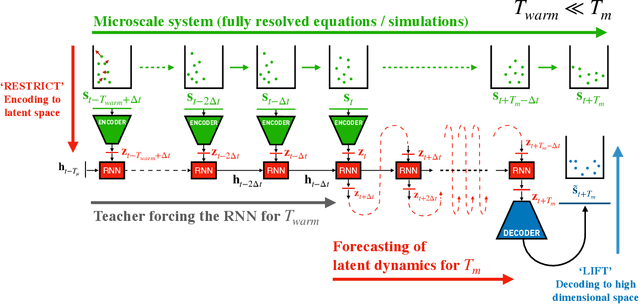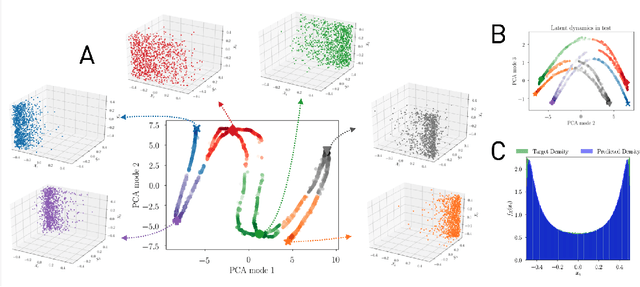Georgios Arampatzis
A generative modeling / Physics-Informed Neural Network approach to random differential equations
Jul 02, 2025Abstract:The integration of Scientific Machine Learning (SciML) techniques with uncertainty quantification (UQ) represents a rapidly evolving frontier in computational science. This work advances Physics-Informed Neural Networks (PINNs) by incorporating probabilistic frameworks to effectively model uncertainty in complex systems. Our approach enhances the representation of uncertainty in forward problems by combining generative modeling techniques with PINNs. This integration enables in a systematic fashion uncertainty control while maintaining the predictive accuracy of the model. We demonstrate the utility of this method through applications to random differential equations and random partial differential equations (PDEs).
Adaptive learning of effective dynamics: Adaptive real-time, online modeling for complex systems
Apr 04, 2023Abstract:Predictive simulations are essential for applications ranging from weather forecasting to material design. The veracity of these simulations hinges on their capacity to capture the effective system dynamics. Massively parallel simulations predict the systems dynamics by resolving all spatiotemporal scales, often at a cost that prevents experimentation. On the other hand, reduced order models are fast but often limited by the linearization of the system dynamics and the adopted heuristic closures. We propose a novel systematic framework that bridges large scale simulations and reduced order models to extract and forecast adaptively the effective dynamics (AdaLED) of multiscale systems. AdaLED employs an autoencoder to identify reduced-order representations of the system dynamics and an ensemble of probabilistic recurrent neural networks (RNNs) as the latent time-stepper. The framework alternates between the computational solver and the surrogate, accelerating learned dynamics while leaving yet-to-be-learned dynamics regimes to the original solver. AdaLED continuously adapts the surrogate to the new dynamics through online training. The transitions between the surrogate and the computational solver are determined by monitoring the prediction accuracy and uncertainty of the surrogate. The effectiveness of AdaLED is demonstrated on three different systems - a Van der Pol oscillator, a 2D reaction-diffusion equation, and a 2D Navier-Stokes flow past a cylinder for varying Reynolds numbers (400 up to 1200), showcasing its ability to learn effective dynamics online, detect unseen dynamics regimes, and provide net speed-ups. To the best of our knowledge, AdaLED is the first framework that couples a surrogate model with a computational solver to achieve online adaptive learning of effective dynamics. It constitutes a potent tool for applications requiring many expensive simulations.
Learning the Effective Dynamics of Complex Multiscale Systems
Jul 01, 2020



Abstract:Simulations of complex multiscale systems are essential for science and technology ranging from weather forecasting to aircraft design. The predictive capabilities of simulations hinges on their capacity to capture the governing system dynamics. Large scale simulations, resolving all spatiotemporal scales, provide invaluable insight at a high computational cost. In turn, simulations using reduced order models are affordable but their veracity hinges often on linearisation and/or heuristics. Here we present a novel systematic framework to extract and forecast accurately the effective dynamics (LED) of complex systems with multiple spatio-temporal scales. The framework fuses advanced machine learning algorithms with equation-free approaches. It deploys autoencoders to obtain a mapping between fine and coarse grained representations of the system and learns to forecast the latent space dynamics using recurrent neural networks. We compare the LED framework with existing approaches on a number of benchmark problems and demonstrate reduction in computational efforts by several orders of magnitude without sacrificing the accuracy of the system.
 Add to Chrome
Add to Chrome Add to Firefox
Add to Firefox Add to Edge
Add to Edge